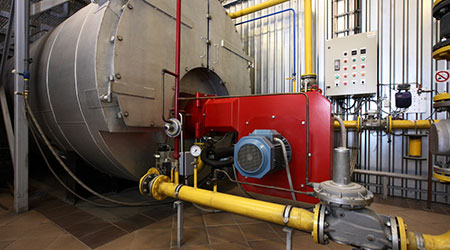A number of conditions can result in sudden, unexpected failure of a boiler pressure vessel, often requiring a complete demolition and replacement of the boiler. These conditions are avoidable when preventative procedures and systems are put in place and followed rigorously, according to an article from Building Operating Management on the FacilitiesNet website. However, these are not always done.
The boiler calamities discussed here all involve a breach of the boiler’s pressure vessel / heat exchanger (those terms are often used interchangeably), either through corrosive action eating its way through the vessel material, or by mechanical failure due to thermal stresses resulting in cracks or separation of components. Often there are no obvious symptoms displayed during normal operation. A failure can be years in the making, or it can come on rapidly due to a sudden change in conditions. Regular maintenance inspections are key to preventing unpleasant surprises. Heat exchanger failures normally require the entire appliance to be replaced, although for smaller and newer boilers, repair or replacement of just the pressure vessel may be a reasonable option.
Here are four scenarios that will inevitably lead to a wrecked boiler:
1. Severe water-side corrosion: Poor quality of the initial water fill can cause some corrosion, but improper monitoring and adjustment of chemical treatment can result in the type of acute pH imbalance that can rapidly damage a boiler.
2. Severe water-side blockage/calcification: Ongoing introduction of fresh make-up water due to water or steam leakage, can quickly layer the water side heat-exchanger components with hard-scale, creating an insulating layer that results in stress fracture from overheating of the metal.
3. Severe fire-side corrosion: Acidic condensate from any fuel can form on heat-exchanger surfaces when the surface temperature is below the dew point for a particular fuel.
4. Thermal shock / stress: Boiler pressure-vessel design, materials, and size, dictate how sensitive a boiler is to thermal shock and stress.
Read the full FacilitiesNet article.

 Seeking Standards for Microbial Loads in Healthcare Facilities
Seeking Standards for Microbial Loads in Healthcare Facilities UCR Health Unveils Plans for Major Expansion
UCR Health Unveils Plans for Major Expansion High-Performance Windows Support Safety at UW Medicine's New Behavioral Health Center
High-Performance Windows Support Safety at UW Medicine's New Behavioral Health Center Central Maine Healthcare Dealing with IT System Outage
Central Maine Healthcare Dealing with IT System Outage Kaiser Permanente Opens Newly Expanded Everett Medical Center
Kaiser Permanente Opens Newly Expanded Everett Medical Center